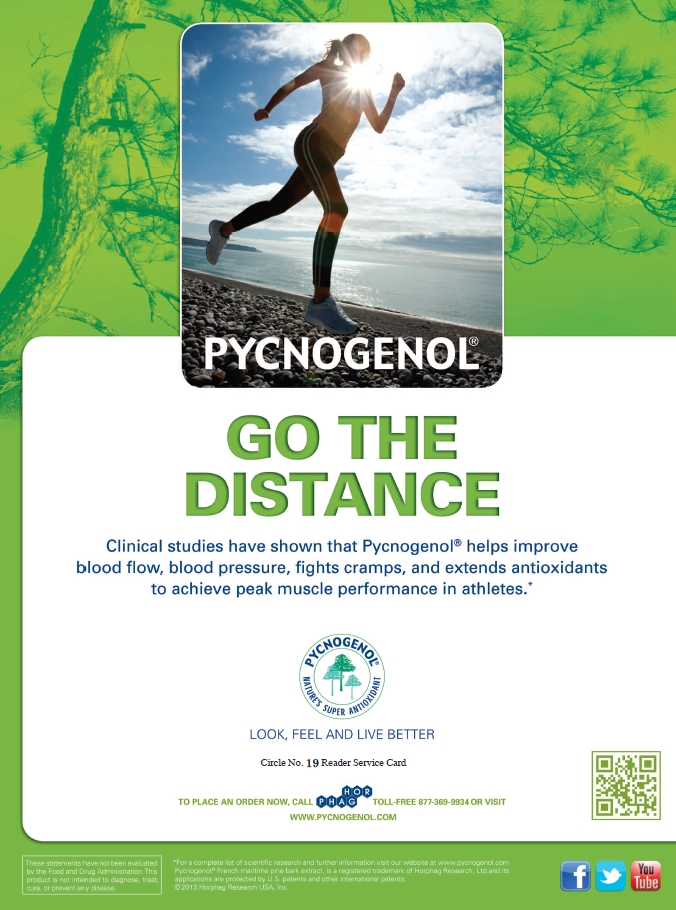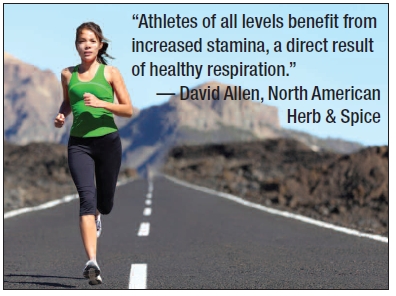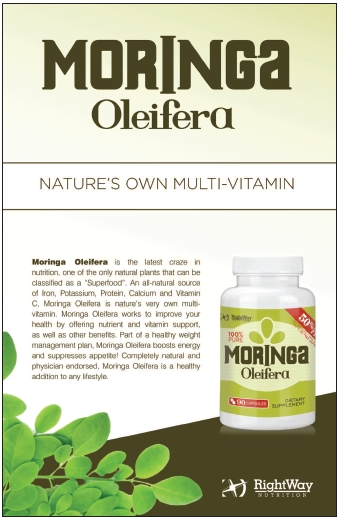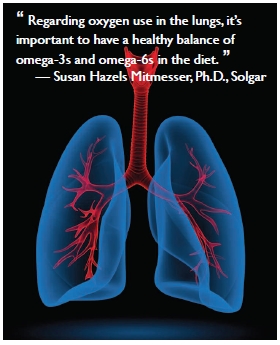Whether they’re running their first 5K or making a career out of sports, athletes of all levels know there are no shortcuts to achieving success. But there are some important early lessons learned while building a foundation for ideal performance.
“The first thing an athlete learns to do is to listen to his or her coach. The second thing is how to breathe,” states Steve Kravitz, president of Earth’s Bounty, Vancouver, WA.
Athletes must control their breathing to maintain a rhythm, get in the zone or keep away the jitters. There’s another very practical reason: healthy respiration keeps energy levels up and the body working properly—and supplements can support these tasks.
“Breath control and breathing are important, no matter what kind of athlete you are,” states Kravitz. “Oxygen is key; there’s no two ways about it.”
Breathing Ins and Outs
While we think of respiration being all about the lungs, there’s more than meets the eye. Sure, the lungs are the organs that allow us to take in air (i.e., ventilation or breathing), but the cells are where all the action takes place for using and converting oxygen (i.e., respiration).
“We often forget what happens after we take a  breath,” says Renee Posner, vice president of sales and marketing at Maharishi Ayurveda Products International, Fairfield, IA. She goes on to explain the two-step process that happens after we take a breath. “First, oxygen is removed from the air and passes into the lungs; oxygen then enters the bloodstream. Second, at the cellular level, oxygen is the basis of metabolism.”
breath,” says Renee Posner, vice president of sales and marketing at Maharishi Ayurveda Products International, Fairfield, IA. She goes on to explain the two-step process that happens after we take a breath. “First, oxygen is removed from the air and passes into the lungs; oxygen then enters the bloodstream. Second, at the cellular level, oxygen is the basis of metabolism.”
Once oxygen enters the lungs, air sacs help diffuse oxygen into the bloodstream. Red blood cells use hemoglobin to carry oxygen through the body to the cells. Here, a chain of chemical reactions called aerobic respiration involves the use of oxygen and glucose in making carbon dioxide and water.
Energy is released in the process, so without adequate oxygen supplies, energy production is inhibited (1). The problem is that physical exercise depletes oxygen levels, forcing the body to work harder to get the fuel it needs to keep going. In the end, an athlete’s stamina is strongly connected to the respiratory process.
“Increasing the efficiency by which oxygen is absorbed and utilized is the key to gaining energy,” states David Allen, sales manager at North American Herb & Spice, Buffalo Grove, IA.
As Simar Singh, founder and CEO of Redtree Nutraceuticals, Inc. (maker of Rootology), Cincinnati, OH, puts it, “Restricted airways…lead to less efficient workouts and more stress on the lungs and heart.” He believes products that help open the airways “can facilitate a better and stronger workout.”
Thus, athletes may have their eyes set on optimizing how the body uses oxygen since “supporting lung function is the first step overall to more stamina,” says Allen.
Allen suggests one way to promote healthy lung function is with the use of oregano oil. This antioxidant has antiseptic properties and is thought to help with clear breathing. Allen’s company combines oregano oil with other spice oils like cumin and sage for respiratory support.
He adds that B-vitamins (like Purely B) are very popular with athletes. States Allen, “Having the necessary intake of B-vitamins is critical for cellular respiration.”
 Singh also feels athletes have much to gain from the B-vitamins because they help red blood cells carry oxygen through the body. He says, “To support the lungs, you must also support the heart to ensure it is pumping efficiently enough to have red blood cells transport the necessary oxygen to all tissues.”
Singh also feels athletes have much to gain from the B-vitamins because they help red blood cells carry oxygen through the body. He says, “To support the lungs, you must also support the heart to ensure it is pumping efficiently enough to have red blood cells transport the necessary oxygen to all tissues.”
Singh believes whole food B-vitamins have an advantage over synthetic for helping the heart get this important job done well. Allen seconds this idea, adding that whole food B-vitamins are “more readily digested and utilized by our bodies. In addition, there is no concern of adulteration.”
Also integral for athletes, says Chris D. Meletis, N.D., naturopathic physician and director of science and research for Trace Minerals Research, Ogden, UT, are CoQ10 and proper mineral replacement, which he believes helps “ensure proper fueling of cardiac performance.” This includes iron, magnesium, phosphate, electrolytes and others.
Another aspect of cellular health for respiration support is cellular membranes, the borders that help let certain compounds into the cell and let others out. Omega-3s and -6s help keep these lipid structures fluid, flexible and permeable; in other words, omegas ensure the membranes are in tip-top shape and able to perform vital functions that lead to energy production (2).
Singh believes that in addition to having omegas in the diet, one should avoid unhealthy fats like trans-fats and hydrogenated oils. “These fats displace the fatty acids in your cell membranes and create chaos in the body,” he explains. “Taking supplements with omega-3s in their natural ratio of DHA/EPA and drinking lots of clean, filtered, mineralized water can also help to support breathing and stamina at the cellular level.” He believes that some other types of water could actually deplete the body of minerals.
But, omegas must be consumed in balance, advises Susan  Hazels Mitmesser, Ph.D., director of nutrition research at Solgar, Leonia, NJ. “An overabundance of omega-6s such as arachidonic acid can lead to the production of molecules such as leukotrienes, which in turn may affect healthy breathing.”
Hazels Mitmesser, Ph.D., director of nutrition research at Solgar, Leonia, NJ. “An overabundance of omega-6s such as arachidonic acid can lead to the production of molecules such as leukotrienes, which in turn may affect healthy breathing.”
Another connection to cellular respiration comes from Donna Noonan, senior vice president of Mushroom Wisdom Inc., East Rutherford, NJ. “From our point of view and expertise, the fungi Cordyceps sinensis is an effective, all-natural dietary supplement that may certainly support athletic stamina.” She gives us a great example of some athletic results achieved with this mushroom: In 1993, Chinese runners broke records in 1,500-, 3,000- and 10,000-meter races. “These record performances were attributed by their coach to the runners’ consumption of cordyceps,” says Noonan.
Jerry Angelini, Host Defense national science educator for Fungi Perfecti, Olympia, WA, says that there is also much historical use of this mushroom. “Cordyceps has been used traditionally by inhabitants of the high altitude (and poorly-oxygenated) regions of Tibet and Nepal. Its long-documented use centers on supporting oxygenation in the lungs and supporting stamina.”
Just how cordyceps may have been connected to sports performance may have to do with how the mushroom affects cellular health. According to Noonan, cordyceps “helps raise the cellular level of adenosine triphosphate [ATP], which is, literally, our energy source in mitochondria.”
One’s ATP stores may become depleted when nutrients, hydrogen and oxygen are missing. “So for athletes and those getting into shape via workouts, concentrating on ensuring one’s ATP levels are in good supply will certainly help with achieving physical goals, and thus, getting into desired shape for competition, or for general good health,” Noonan believes.
Oxygen supplements are another route, and their purpose is multi-fold. “One is to increase the amount of oxygen in your system,” Kravitz states. Their other use has to do with lactic acid, which builds up in the muscles during physical activity from anaerobic respiration and makes the muscles sore.
“The effect of oxygen is not just to increase your performance, but also to delay the onset of oxygen debt,” he explains. The reason why, he states, is that oxygen supplements can help flush out the lactic acid fast. “When you take an oxygen supplement, it allows you to do a little bit more,” states Kravitz.
 Athletes should also consider their carbohydrate intake for proper cellular fuel. “Carbohydrates yield more calories per liter of oxygen consumed as compared to fats,” explains Hazels Mitmesser. “Therefore, it’s important to intake adequate carbohydrates during meals and competition since carbs are a more efficient cellular fuel.”
Athletes should also consider their carbohydrate intake for proper cellular fuel. “Carbohydrates yield more calories per liter of oxygen consumed as compared to fats,” explains Hazels Mitmesser. “Therefore, it’s important to intake adequate carbohydrates during meals and competition since carbs are a more efficient cellular fuel.”
As for supporting the lungs and respiratory tract, there are several nutrients athletes may want to know about. For instance, Meletis suggests N-acetyl cysteine and glutathione for supporting lung health and controlling mucus. He also states that magnesium is “essential because it can help keep the airway relaxed.”
Athletic support is also about ensuring electrolytes are properly replenished for ideal cellular health. “It’s important that athletes understand that proper mineral replacement is more than just replacing calcium, magnesium, potassium and sodium for muscle performance,” Meletis believes. “They also need to replace a full spectrum of minerals and trace minerals that are lost in sweat during exertion.”
Some nutrients may be beneficial because they support nitric oxide (NO) production, which supports stamina. Angelini explains that NO helps trigger the dilation of blood vessels. “This allows for a greater volume of blood to be circulated throughout the body with the accompanying increase of oxygen-rich blood,” he states.
While it’s crucial for athletes to have proper NO levels during physical activity, Meletis says many of his athletic patients have suboptimal amounts. “Since the half-life of NO is a mere three to five seconds, ensuring that sufficient substrates are present to help with endothelial function is critical,” he believes.
Amino acids like l-arginine and l-citrulline are said to be useful for NO formation, and since homocysteine may decrease NO bioavailability, proper folic acid levels are beneficial, too. Last, free radicals may interfere with NO availability, so antioxidants like vitamins C and E may help.
Alan Marks, CEO of Maharishi Ayurveda Products International, has a slightly different take on the matter.
|
Select Respiration Support Fungi Perfecti/Host Defense: Host Defense CordyChi, Cordyceps, Reishi. |
|
He believes those who are physically active should consider digestion support an integral part of their health. The reason why, he believes, is that to perform at its best, the body must assimilate what it takes in as efficiently as possible. “When this is accomplished, the body is then able to metabolize all activity including sports in the most efficient and effective manner. This is why there is so much emphasis on diet associated with peak performance,” he says.
Marks believes that if food isn’t metabolized properly, ama (which he says is the “equivalent of free radicals in the Western understanding”) obstructs the body’s functions. “This stagnation, this hindrance of the flow of knowledge across cellular systems, will necessarily make respiration and athletic metabolism less efficient,” he states, adding that his company recommends its digestion-support supplement and an amla product to support cellular health.
Who’s Who of Respiration
Two athletes walk through your door. One is a lean endurance athlete and the other is a muscular short-burst-of-power athlete. Which benefits more from respiration-support supplements?
If you said the endurance athlete, you’re half-right. “It goes without saying that endurance athletes such as marathon runners, cyclists and those involved in long-distance events that tax the aerobic system would stand to benefit the most from supplements that support respiration,” states Hazels Mitmesser.
Meletis feels athletes who partake in mostly aerobic exercise are especially good candidates for needing a little extra support from antioxidants. “These athletes breathe rapidly and deeply, consuming more oxygen, therefore dispersing more oxygen to the tissues in the body, bloodstream, muscles, organs, heart, lungs and so forth,” he states. Since free radicals from oxygen damage the body everyday, antioxidants are very helpful.
“Glutamine is a must,” Meletis feels. “Exercise demands that more glutamine gets utilized by the muscles, which can cause a depletion in other tissues that need it for optimal function.”
Now, athletes needing bursts of energy (like football or baseball players) can find respiration supplements just as helpful. “These types of sports involve short bursts of high-intensity movement, which stress both the aerobic and anaerobic energy systems,” says Hazels Mitmesser. “Having a high level of cardiovascular and respiratory fitness as well as muscular power is important for athletic success.”
So, train your sales staff to consider respiration support appropriate for either endurance or burst-of-power athletes.
“Both types require outstanding ability to respirate, as each endeavor requires high energy output either in short bursts or for the long haul,” says Noonan.
Now, what about a more casual athlete or someone just getting into an exercise regimen? Yep, they, too, can benefit from respiration support.
States Angelini, “Mall-walkers, weekend-warriors, steady gym-bunnies, hardcore amateur athletes or even the professional athlete…Each person has his/her own needs in relation to exercise, performance and respiration.” Yet, he believes people of all levels of athletic skill and conditioning can benefit from certain respiration-support supplements.
He states, “For the person who is lethargic and easily winded, to even the most conditioned triathletes, cordyceps supports oxygen uptake and athletic performance, while reishi’s adaptogenic compounds may help with endurance and cardiovascular functioning.”
Kravitz believes that oxygen supplements are also helpful for people just starting an exercise regimen, especially if they find physical activity difficult and get out of breath very quickly.
Elle Markey, director of sales and marketing at NuCentury Herbs, Inc., Michigan City, IN, adds that location is a factor, too: “Some athletes want additional respiratory support for an existing health condition or environmental challenges.” Regarding the latter, this could mean getting a boost for high-altitude training.
As for existing health issues, supplements may benefit—though not treat, cure or prevent—asthma.
Always in Season
Shoppers interested in respiration support may wonder whether supplements are more beneficial when taken year-round or during an athlete’s peak season, and whether taking them immediately before exercise is worth it.
The answer is that it depends on the supplement. For instance, something like an omega takes time to build up in one’s system. Hazels Mitmesser suggests taking them daily with meals as opposed to before or after exercise.
Likewise, she says boswellia, an Ayurvedic herb, supports healthy breathing and also has cumulative effects. Says Hazels Mitmesser, “Athletes may want to try adding this botanical to their regimen during their peak season for added support.”
Marks speaks about how Ayurvedic herbs could fit into the picture for respiration support. He agrees with Hazels Mitmesser that “supporting health throughout all of the seasons is important” since this helps create the basis for optimal performance. Then, one might use certain herbs for extra support. Says Marks of some formulas offered by his company, “Premium Amla Berry, known for its rejuvenation properties, may be taken in the morning just after athletic activity and in the evening. When taken with Digest Tone (Triphala Plus) it is a powerful combination in supporting dynamic activity.”
Meanwhile, Singh points out that taking B-vitamins and minerals year round is a good idea, especially since so many people are deficient in them. But athletes may benefit from increasing the dose while training and competing, whether it’s before or after physical activity.
Mushrooms are another hybrid: great over the long-term and helpful before physical activity. Angelini says, for instance, that cordyceps and reishi are “supportive on a daily basis and over a long period of time for energy and breathing.”
And, Noonan points out that cordyceps can be taken approximately one half-hour before physical activity and afterward to aid in recovery and repair.
Still other respiration-support natural products act quickly. Meletis says electrolyte-replacement products should be taken before, during and after a high-intensity workout “for maximum benefit and recovery.”
Kravitz says the effects of oxygen supplements are also felt very quickly. “People will notice a 2–3% gain in their ability to do more,” he believes. Experienced endurance athletes sometimes use oxygen supplements to oxygenate their water as they are working out.
Another such fast-acting product comes from Markey’s company (AirAide). While some shoppers take the supplement for daily maintenance (up to three times daily), others use it about 45 minutes to an hour before physical activity for respiratory support because the formula has no loading time. “Listen to what your body needs,” says Markey. “Traditional Chinese Medicine, on which our formula is based, is about balance.” WF
This sports nutrition series is sponsored by


References
1. BBC, KSE Bitesize Science, “The Respiratory System and Ventilation,” www.bbc.co.uk/bitesize/ks3/science/organisms_behaviour_health/life_processes/revision/4, accessed Aug. 21, 2013.
2. Linus Pauling Institute, “Essential Fatty Acids,” http://lpi.oregonstate.edu/
infocenter/othernuts/omega3fa, accessed Aug. 21, 2013.
Published in WholeFoods Magazine, October 2013










